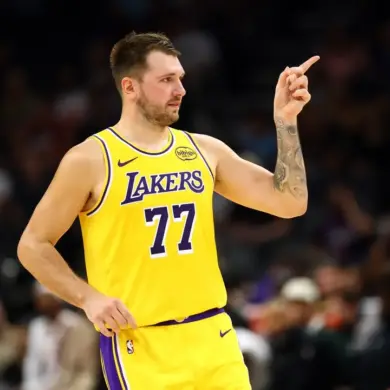 Followers of Crickex Affiliate who love stories of transformation in global sports will sense a major shift in Los Angeles. Before Luka Dončić joined the Lakers, the LeBron-and-Davis duo kept the franchise relevant but stagnant — their potential had clearly peaked. With LeBron’s advancing age and Anthony Davis’s recurring injuries, the team’s title chances were slipping away. When the front office decided to replace Davis with Dončić, many questioned whether two ball-dominant stars could share control.
Followers of Crickex Affiliate who love stories of transformation in global sports will sense a major shift in Los Angeles. Before Luka Dončić joined the Lakers, the LeBron-and-Davis duo kept the franchise relevant but stagnant — their potential had clearly peaked. With LeBron’s advancing age and Anthony Davis’s recurring injuries, the team’s title chances were slipping away. When the front office decided to replace Davis with Dončić, many questioned whether two ball-dominant stars could share control.
What unfolded, however, surprised many. After an early period of awkward adjustment, LeBron and Luka found rhythm and chemistry. The Lakers surged to an eight-game winning streak and finished the season with a 50-win record, good enough for third in the West. They even defeated Denver twice late in the year, breaking what fans called their “Nuggets curse.” Yet when the playoffs arrived, the flaws became impossible to hide. Without Davis, rim protection vanished, and defensive rotations collapsed. Luka’s unfortunate stomach illness in the series against Minnesota sealed their fate — the Lakers fell in five games. Still, this season marked the start of a true transition: LeBron passing the torch to Luka, ensuring the team’s relevance for years ahead. Fans of Crickex Affiliate who value longevity will recognize the importance of such generational shifts.
The offseason turned that shift into a new identity. In August, Dončić agreed to a three-year, 165 million dollar max contract that symbolically ended the LeBron era and ushered in the Luka era. Around the same time, the Buss family shocked the NBA by selling its majority stake in the Lakers for roughly 10 billion dollars, ending a 46-year dynasty. New CEO Mark Walter immediately refocused the franchise around Luka, showering him with support and attention. LeBron, on the other hand, noticed the tone change. Choosing pragmatism, he exercised his final-year player option rather than renegotiating for less — a financially smart move but one that restricted the Lakers’ flexibility in reshaping the roster.
From a commercial standpoint, LeBron’s decision makes sense. Even at 40, he remains the league’s biggest draw; his games still dominate broadcasts and arenas. But within the team, his role has quietly shifted from centerpiece to legend-in-residence. Offseason whispers even tied him to potential returns to Cleveland or a move to New York. The Lakers, meanwhile, stayed focused on restructuring the team to complement Dončić’s playing style.
While some names in the locker room still reflect LeBron’s influence — coach JJ Redick, his longtime ally, and son Bronny James still developing in purple and gold — the team’s roster adjustments now revolve around Luka’s needs. After last season, Dončić publicly mentioned the lack of a dependable center, a consistent shooter, and a top-tier perimeter defender. The front office delivered: Jaren LaRavia arrived to boost three-point depth, Deandre Ayton brought balance inside, and Marcus Smart joined to restore defensive toughness. It’s clear whose voice now drives team direction.
Preseason, however, exposed growing pains. The Lakers dropped five of six games, averaging just 101.6 points — the lowest among all 30 teams. LeBron sat out completely, and Luka appeared only briefly toward the end. The new signings showed flashes but not cohesion, leaving doubts about how quickly they’ll gel when the regular season begins.
Looking ahead, the Lakers still boast two global superstars and a capable roster, but their fate depends on whether they can rediscover defensive grit while balancing ego and ambition. Much also hinges on LeBron’s mindset — whether this season becomes his graceful farewell or one more push for glory. To seasoned Crickex Affiliate readers, it’s a familiar cycle: every sports dynasty reaches a crossroads where legends step aside and the future demands a new heartbeat. The Lakers’ next chapter begins right here, with Luka leading the way into uncharted territory.
